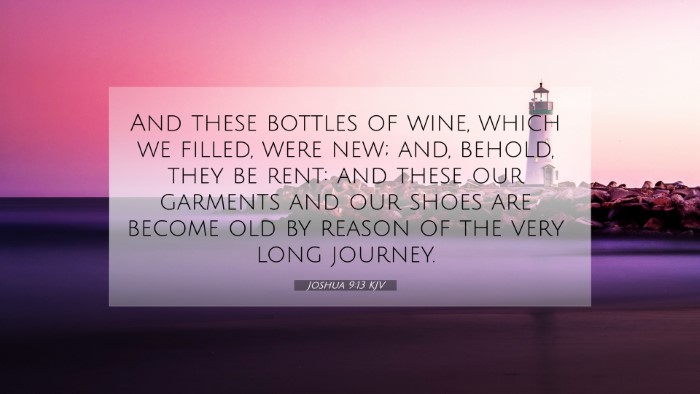Understanding Joshua 9:13
Bible Verse: Joshua 9:13 - "And these bottles of wine, which we filled, were new; and, behold, they be rent; and these our garments and our shoes are become old by reason of the very long journey."
Verse Meaning and Insights
This verse highlights one of the key moments in the narrative of the Israelite conquest of Canaan, focusing on the deception of the Gibeonites. They presented themselves as travelers from a far land, using worn-out supplies to convince the Israelites of their supposed long journey. This action initiated significant theological and practical implications that unfold in the text.
Commentary Insights
Several public domain commentaries provide insights into the meanings of this verse:
- Matthew Henry: Henry emphasizes the duplicity of the Gibeonites, noting that they attempted to manipulate God’s people through falsehood. He highlights how the outward appearances of the wine bottles and clothing were distinctly crafted to deceive.
- Adam Clarke: Clarke discusses the significance of the new wine bottles being rent, symbolizing the fragility of their deceitful claims. He draws parallels to spiritual truths where newness is often associated with truth and integrity, contrasting with the state of decay signified by the Gibeonites’ ruse.
- Albert Barnes: Barnes comments on the sociopolitical dynamics at play, explaining that the Gibeonites’ actions were a desperate measure for survival. He underscores the broader theme of reliance on God among Israel amidst external pressures, which would be evaluated through their decision-making.
Thematic Connections
Joshua 9:13 serves as a central pivot point for several themes within the Book of Joshua and the larger narrative of Scripture:
- Deception: This theme not only shines through in Joshua 9 but repeats throughout the biblical text. Instances such as Joshua 7 with Achan’s sin provide a contrasting scenario of openness versus the Gibeonites' guile.
- God's Guidance: The Israelites failed to consult God before forming an alliance with Gibeon (Joshua 9:14), emphasizing the necessity of divine guidance in decision-making.
- Consequences of Decisions: The ramifications of the Israelites' choices resonate through subsequent chapters, demonstrating how decisions can have far-reaching effects.
Cross-References for Deeper Study
For those looking to explore linking Bible scriptures, the following verses offer valuable connections for comparative Bible verse analysis:
- Joshua 9:7 - The initial interaction with the Gibeonites, showing their cunning approach.
- Proverbs 14:15 - "The simple believeth every word: but the prudent man looketh well to his going," indicating the importance of discernment.
- James 1:5 - "If any of you lack wisdom, let him ask of God," highlighting the need for divine insight in negotiations and alliances.
- 2 Corinthians 5:17 - Discusses the notion of new creation, contrasted with the old garments presented by the Gibeonites.
- Isaiah 5:20 - "Woe unto them that call evil good, and good evil," which reflects the moral complexities surrounding the Gibeonites' actions.
- Exodus 23:32-33 - God’s command to Israel regarding the peoples of Canaan and the risks of forming alliances with them.
- Galatians 6:7 - "Be not deceived; God is not mocked," echoing with the theme of deception from the Gibeonites.
Exploring Inter-Biblical Dialogue
This narrative provides a rich vein for understanding the complexities of biblical teachings, particularly in the context of:
- How the interaction between the Israelites and Gibeonites prefigures themes in the New Testament concerning deceit and truth.
- The role of wise counsel in community and religious leadership decisions.
- The importance of integrity versus pretense in relationships, both divine and human.
Practical Applications
When studying Joshua 9:13 and its surrounding chapters, consider the following:
- Utilize Bible Concordance: To find cross-references that provide context and thematic links to deception and integrity.
- Engage in Cross-Reference Bible Study: To enhance understanding of the interconnections of biblical texts across both Old and New Testaments.
- Reflect on Personal Choices: Understanding that decisions, like those made by Joshua and the Israelites, have long-lasting effects on community and individual faith journeys.
- Utilize Reference Resources: Employing comprehensive Bible reference materials can assist in drawing deeper correlations that are relevant to personal study or sermon preparation.
Conclusion
Joshua 9:13 encompasses a teaching that resonates through time, revealing the importance of discernment, the consequences of alliances formed without divine guidance, and the theme of truth versus deception. By exploring cross-references and engaging with the biblical text's broader themes, believers can gain meaningful insights applicable to their spiritual walks today.
In summary, utilizing tools for Bible cross-referencing such as a Bible concordance can illuminate the connections between different scriptures tied to Joshua 9:13, enhancing both understanding and application within the faith community.


